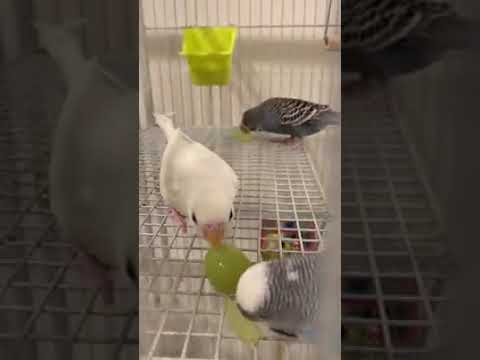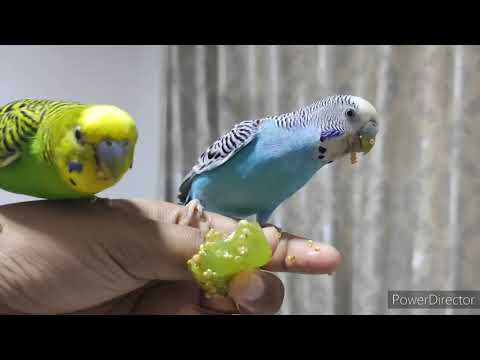Are you wondering if you should give grapes to your budgies? Or they’re among the foods they warn you to keep away from your budgies to avoid poisoning them or bringing health problems to them? If yes, this guide is for you.
Can budgies eat grapes? Yes, budgies can eat grapes. These fruits contain multiple nutrients such as Vitamins A and C, minerals like potassium, and even antioxidants, all of which promote healthy budgies. However, you shouldn’t feed grapes to your buddies in large quantities as they may have side effects due to their high sugar content.
The article gives you more details on how you should feed grapes to your little feathered birds, what health benefits the fruit offers, how many grapes to provide them with, and the precautions to observe when giving the fruit to your budgies.
Can you feed grapes to budgies?
Yes, grapes are 100% safe to feed to your budgies. They’re not only sweet and juicy but are also a healthy treat that provides them with many vital nutrients the birds need for continued healthy growth and development.
And yes, you can feed all types of grapes to the bodies, including red, green, or purple grapes. Each of these different grapes has its own texture and flavor; feeding them to your bird at different times will help introduce them to different treats of the same fruit.
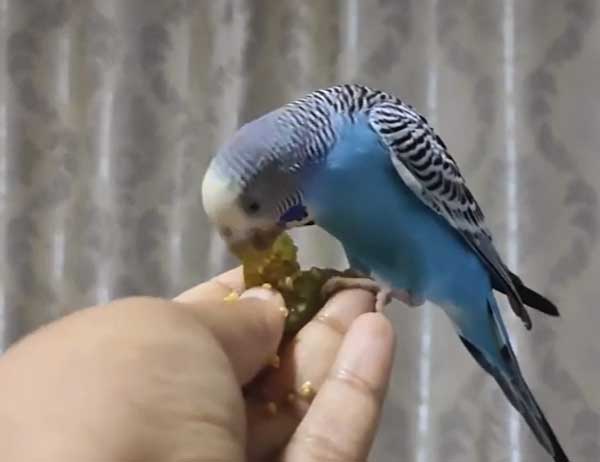
Because budgies in the wild have their diet revolving around seeds, berries, vegetables, and a variety of fruits (including grapes), you should have no doubts or worries about feeding these fruits to them in captivity.
However, make sure you give them a well-balanced diet to help fulfill their nutritional requirements without subjecting their bodies to any side effects.
As we have hinted in the intro, you shouldn’t feed your budgies too much of these grapes, no matter how much they seem to enjoy them. This is because too much of these fruits can cause health issues like obesity due to the high sugar content they carry.
We have discussed more details about the risks of feeding too many grapes to your budgies later in this guide.
You’ll also need to wash them well before feeding them to the birds to eliminate any chemical pesticides and other things that may bring harm to your bird.
Do Budgies Like grapes?
Budgies do like grapes a lot! Budgies have a soft spot for the sweet and juicy foods and show an immense liking for them. They can even easily get addicted to such food. And grapes qualify for this description.
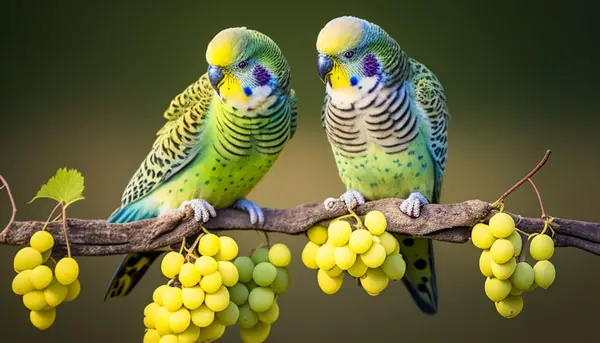
If the birds in the wild like grapes, then your budgies in captivity are not different and will likely be them. Budgies in the wild, in particular, love accessing grapes occasionally, which means they don’t overfeed on them and stay healthy.
However, as we always advise you, your parakeet may initially not show interest in grapes. This is because all birds have their preferences and tendencies, like humans.
If you try introducing grapes to the birds and they don’t show interest, even after a few days, you may want to stop feeding them with it. There’s no special reason why you should force-feed grapes to your budgies.
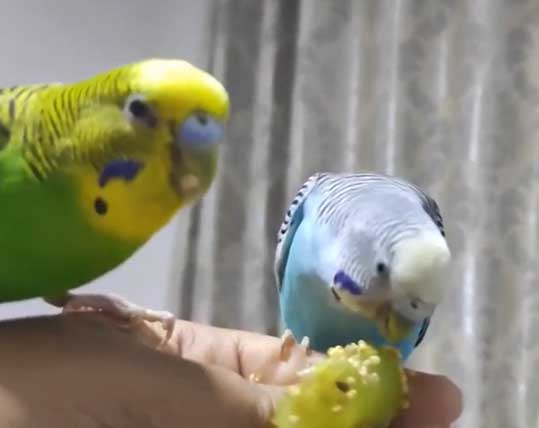
As for the benefits of the grapes, they can get them in other fruit varieties with the same nutritional value that the birds may like.
Health Benefits For Budgies Eating grapes
Regardless of the variety, Grapes carry plenty of nutritional goodness that can play a crucial role in meeting the budgies’ diet requirements. Below, we have discussed the key health benefits your bird will enjoy from this fruit.
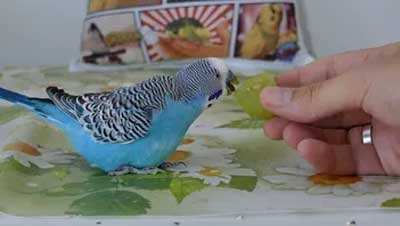
Plenty of vitamins
Yes, grapes are packed with vitamins that play an important part in the budgie’s health. These include vitamins B6, B-complex, C, and K.
- Vitamin B-complex (Thiamin): This vitamin is crucial for the proper functioning of your feathered friend’s nervous system. Thiamin deficiency results in loss of appetite, seizures, and even death in severe cases.
- Vitamin B6: This vitamin is responsible for protein metabolism in the parakeet’s body. Its deficiency can lead to stunted growth and egg production difficulties, making the bird appear dull and impoverished due to poor appetite.
- Vitamin C: Helps reduce bird stress, create antibodies, and strengthen the bird’s immune system.
Minerals
Grapes are also rich in minerals such as copper and potassium. Potassium, in particular, plays a vital role in speeding up metabolism in the bird’s body. Moreover, it helps strengthen the bird’s bones minimize blood pressure, retain water in her body, and prevent diseases like kidney stones, stroke, and osteoporosis.
Antioxidants
Grapes carry antioxidants such as polyphenols, carotenoids, and others. These help prevent cancer, the hardening of the arteries (atherosclerosis) and ensure a healthy heart.
Resveratrol
This compound is only found in a few fruits, such as cranberries, blueberries, peanuts, and grapes. Resveratrol helps boost the bird’s immune system, inhibit free radicals’ production, and prevent arteries’ hardening. Keep in mind that this compound is in the red grape varieties.
How many grapes should budgies eat?
You should give grapes to your birds as occasional healthy treats. Give them 1-2 small grapes once or twice a week. Why limit the grape intake for the budgies/ Because overfeeding them with this fruit can result in serious health problems.
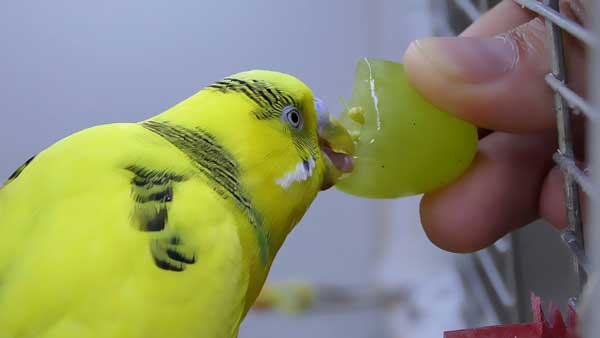
We have already said that the grapes are highly nutritious. But if you’re not careful how much you feed your budgies, they might have the side effects below.
Obesity
Grapes contain a high content of fructose (the natural sugar in birds). To be more precise, a grape contains up to 12 grams of fructose. This is what gives them a sweet taste.
While we humans can easily digest this high sugar content, it’s too much for birds’ digestive systems as they can’t produce enough enzymes to digest them.
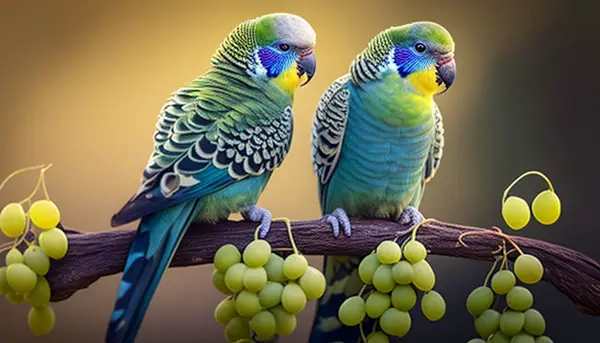
As a result, this ends up upsetting their stomach and leading to obesity and other diseases like diabetes, obesity, and heart problems.
Runny droppings
Another fact about grapes is that they contain up to 84% water. Water is good for keeping your budgies hydrated, especially during hot weather.
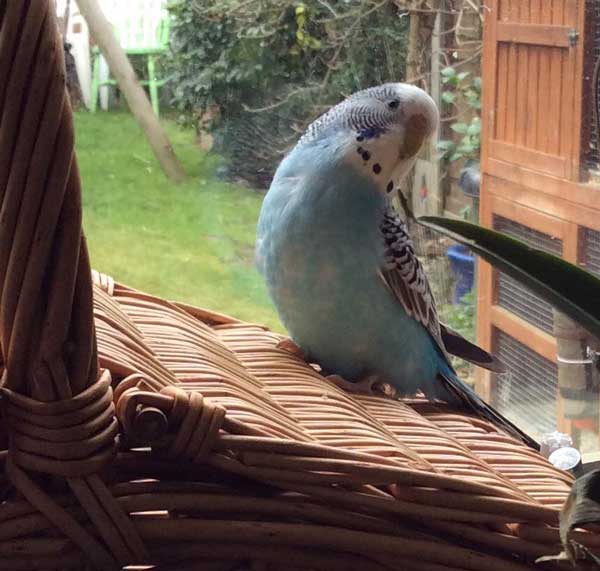
But then again, all this juice can prove too much for your budgies. This is because they ideally need to be fed a diet high in fiber and low in the water to keep their digestive system in check.
As a result, feeding the buddies too many grapes will trigger problems like dropping watery stools and diarrhea. And ultimately, these problems can take a toll on their body.
How do you prepare grapes for budgies?
You should also learn how to properly prepare grapes for budgies to ensure they enjoy eating them and avoid any harm that may arise from not preparing the fruits correctly.
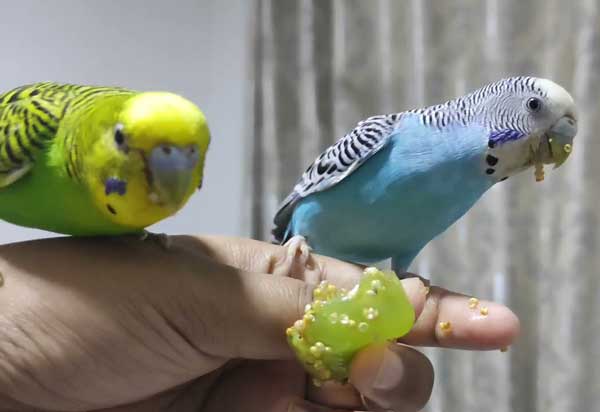
Now, the preparation process for grapes for budgies is pretty simple. You first need to wash your grapes thoroughly. Grapes usually feature a wax-like pouter covering where the pesticides and fertilizers tend to attach. Needless to say, these can cause health problems if your little feathered buddies eat them.
Wash your fruits correctly and rinse them to eliminate any toxic substances attached to them. Consider immersing them in a fruit wash solution and gently scrubbing them. Don’t have the fruit wash? No problem. You can come up with a homemade cleaning solution that comprises one-part baking soda or vinegar added to 3 parts of water.
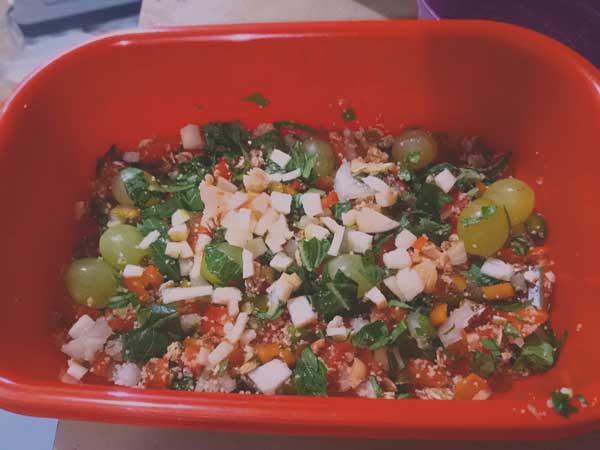
Afterward, cut the fruits into smaller pieces to make them easier for your birds to eat. Simply cut each grape into 2-4 pieces, and your birds should be able to feed on them without any problems.
Can you feed grapes to baby budgies?
Absolutely! You can feed the young budgies the sweet and juicy fruit as well. Wild budgies always feed them to their little ones in the nest, so giving them to the domesticated little budgies is not a problem.
However, you’ll need to prepare them correctly to enable the baby budgies to eat them without any problems.
As discussed above, you should clean the fruits properly to remove any harmful toxins that may be inhabiting their surface.
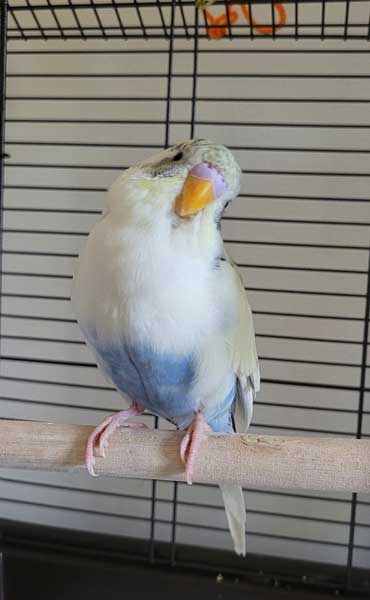
Next, you’ll need to remove the skin from the grapes to make it easy for the little budgies to feed on the fruit’s flesh.
We also advise you to cut the grapes into smaller pieces since the young birdies can find it overwhelming taking on the oversized food items given their small size.
And finally, make sure you remove the seeds before feeding the grapes to baby budgies. The seeds can become a choking hazard for the little budgies. Besides that, grape seeds don’t pose any health risks to these birds.
Video of a Budgie Eating grapes
As you can see in the following video, the cute budgies enjoy eating grapes as they’re handfed by the owner.
Related questions (FAQ):
You can feed dried grapes to budgies; your birds may seem to like them even more than fresh ones. However, we don’t recommend them. This is because the dehydrated foods have high sugar content translating to more calories than fresh grapes.
Budgies can eat grape skin. Mind you, the skin carries a high concentration of nutrients. However, we only recommend feeding your budgies the skin of organic grapes. These are safer and don’t contain fertilizers and pesticides on their surface. If you’re dealing with inorganic variety, consider feeding your budgies the inner flesh only.
Final verdict
Nice, fresh grapes are good for your budgie’s health, and you should make a point of treating them with such. The budgies will enjoy these fruits since they’re sweet and juicy. They also provide them with plenty of nutrients that promote the bird’s good health. Be sure to follow our guides above on preparing the grapes to ensure you feed them to your birds safely.
We, however, recommend against feeding your feathered friends too many grapes. Remember, these fruits contain high fructose levels and can harm the birds’ health. Only feed them once a week as a healthy treat and limit it to 1-2 small grapes. This way, your bird can enjoy the health benefits of this fruit without developing any health issues.
Do you know if your budgies can eat watermelon or cucumber? Read our articles about it to learn more.

